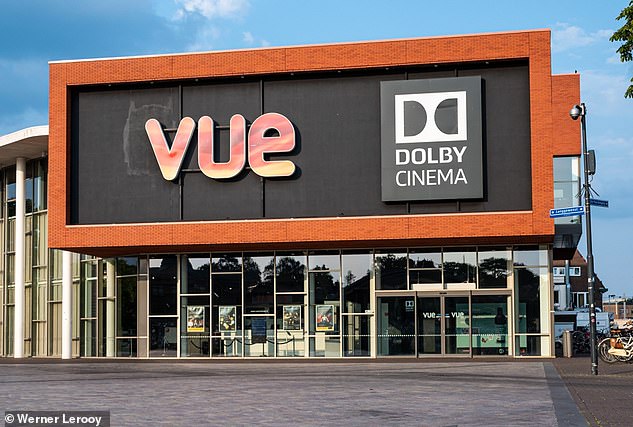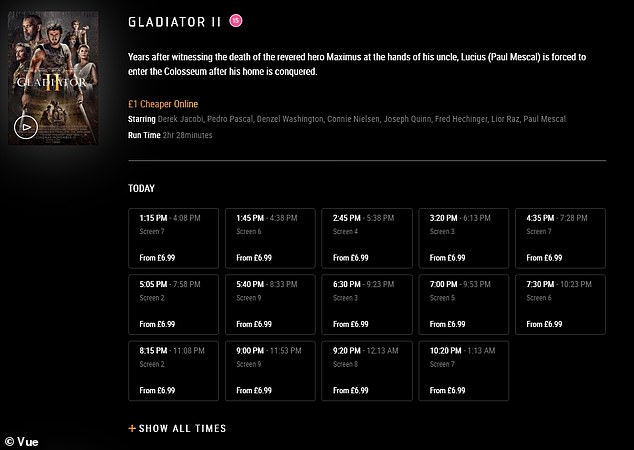Now CINEMA is following you: Popular British chain secretly uses AI to monitor viewers, including their seat choice and snack selection
From smartphones to air fryers, several popular gadgets have been found to ‘spy’ on users.
Now it seems that even the cinema is not safe.
British cinema chain Vue is quietly using artificial intelligence (AI) to track viewer habits and increase attendance.
The system affects all 93 cinemas in Britain and Ireland and identifies the best locations and times to show films to maximize ticket sales.
So if you saw ‘Gladiator II’ or ‘Paddington in Peru’ in a Vue cinema this weekend, chances are your viewing habits were used to determine future screening times.
While the news may set off alarm bells for moviegoers, experts say the technology doesn’t have to be a problem.
James Bore, an expert at consultancy Bores Group, told MailOnline: ‘This type of data analysis has been around for decades.
‘They don’t need your identity and collect the data of everyone in an area to find out when is the best time to show a movie, what movies they can show, how many staff they need, popcorn to prepare , and so forth. ‘
From smartphones to air fryers, several popular gadgets have been found to ‘spy’ on users. Now it seems even the cinema isn’t safe (file photo)

British cinema company Vue uses artificial intelligence (AI) to track viewer habits and increase attendance. The system affects all of its 93 cinemas in Britain and Ireland, identifying the best locations and times to show films to maximize ticket sales
Vue founder and CEO Tim Richards has previously described his company as “pioneers in technology worldwide.”
“AI is responsible for booking all our screens and determines what we show in which cinema, on which screen and at what time,” he said Term.
“Our system is a proprietary system that we developed ourselves and it is a classic AI that is constantly learning and evolving.”
Vue’s AI is present in the booking engine on the website and in the app and creates movie schedules based on customers’ previous booking habits and their locations.
By analyzing past preferences and sales data, it determines where and when Vue shows its films – i.e. how many screenings per day and at what times.
For example, if a Vue cinema at a certain location sells many children’s tickets on a Saturday during the day, the AI ’learns’ that the location has many families.
Meanwhile, if the AI sells out Polish films in a particular location, it knows that there is a large Polish community in that area, meaning it will suggest more Polish film screenings in the future.
This allows Vue cinemas to identify the best times to show certain films to maximize ticket sales while reducing the chance of near-empty cinema screenings.

Vue’s AI is present in the booking engine on the website and app and creates movie schedules based on customers’ previous booking habits and their locations
The AI’s learning capabilities reportedly even extend to snack selection, allowing movie theaters to anticipate where there will be the most demand for popcorn, candy, and more.
Jake Moore, security consultant at ESET, said the rise of artificial intelligence is “revolutionizing many industries, including film.”
‘Factors built into the algorithm are based on demand, time of day and even seat preferences, all helping the sector to maximize profits,’ Moore told MailOnline.
“By enabling personalized marketing and streamlining operations, AI improves the cinema experience and helps theaters stay competitive.”
Apart from the location of your chosen cinema, Vue’s AI is unlikely to collect any personal data such as your name, age or exact address, Mr Bore believes.
“Vue could use your identity to advertise films through marketing emails that they think match your viewing profile, but that would require you to be opted into their marketing,” he added.
CEO Tim Richards – who co-founded Vue as ‘Spean Bridge Cinemas’ in 1999 – said Vue’s AI “knows a lot about our audience” at a given location.
“So it knows that there is a small Turkish community near Islington where we could put additional screens for that audience showing Turkish films,” he told Deadline.

If you saw the new film ‘Gladiator II’ in a Vue cinema this weekend, there’s a chance your viewing habits are being used to determine future screening times
“We know that in certain parts of the country there is a large Polish community where we would bring more Polish films.”
Mr Richards said the AI system started “almost nine years ago” but the company is “only now starting to talk about it”.
It’s unclear whether Vue customers knew their habits were being looked at in this way until now.
“We have rolled it out in Italy and we are seeing the same promising results there as in Britain, and we will roll it out in all our markets,” he added.
‘Our business is film, but in periods when we have some extra screen time, we organize music, theater and sporting events.
“And the AI will also plan alternative programming events around our feature films.”
In an official statement, Vue told MailOnline that its AI scheduling system was introduced in 2016 and is “improving year on year”, but stressed that it is not “customer looking”.
“Our scheduling system optimizes cinema schedules based on attendance and store data at an aggregate level, allowing us to fine-tune our scheduling based on years of historical data so that each cinema plays different films at different times and on each day of the week,” it says. said.
‘No personal data is stored, we can only look at the number of tickets we have sold, for which titles and when – and at what price.’
Comparing performance against its closest competitors, it appears Vue’s AI approach has worked, reports the Times.
Vue’s annual ticket sales were £206m, more than rivals Cineworld (£199m) and Odeon (£196m), although all three are facing declining revenues.
Vue revenues fell 1 percent, while Cineworld and Odeon fell 15 percent and 12 percent respectively.
The film industry was largely decimated by Covid before receiving a much-needed injection in the fall of 2021 from the James Bond film No Time to Die.
Movie theaters also benefited from the buzz surrounding Barbenheimer — the simultaneous release of “Barbie” and “Oppenheimer” last summer.
In Britain, the two films grossed £30 million in their opening weekend, making it the most successful weekend for British cinemagoers since 2019.
In the following months, ‘Barbie’ and ‘Oppenheimer’ pumped in a remarkable £140 million at the UK box office.
Industry figures hope ‘Gladdington’ – the simultaneous interest of ‘Paddington in Peru’ and ‘Gladiator II’ released this month – will achieve similar figures.
